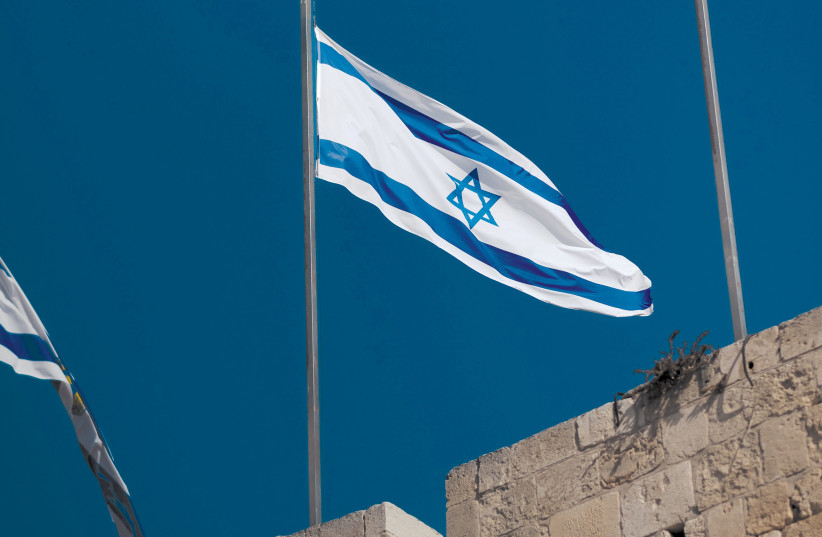Now that the High Holy Days are over, let’s start planning what should be the most hyped holiday of this year: Israel’s 75th birthday. Although Israel was founded on May 14, 1948, its diamond jubilee celebration will be, by the Hebrew calendar, on April 26, 2023, 189 days from today. Although only six months remain to figure out how to celebrate the greatest modern Jewish miracle, few Jewish organizations or Israeli leaders seem to have noticed or started planning.
Last May, I tried triggering some brainstorming about how to celebrate this culmination of the arc of Zionist triumph: starting last August with the Zionist Congress’s 125th anniversary, building through this November 29, with the 75th anniversary of the United Nations’ 1947 recognition of Israel and culminating with Israel’s 75th birthday. Celebrating those three moments toasts the idea of a Jewish state, the world’s recognition of that idea and Israel’s realization of that noble, liberating idea.
As the date approaches, I become more dismayed by the organizational and political torpor, and as anti-Israel and anti-Jewish attacks metastasize, it’s clear that we need our friends in Hollywood to help make this moment.
The war against Israel and the Jewish people is now a cultural war. When there is so much hatred against what Israel is, not just what Israel does, when bash-Israel-first has become an instinctive posture, an obsessive pursuit and a shorthand for proving yourself to others, the battleground must shift. I still advocate the Zionist salons, Israeli historical exhibitions, Diamond Jubilee Presidential medals, Zionized haggadot and ice-cream-for-breakfast-eating initiatives I championed last spring.
But in our wired world, where American adults average 11 hours of interacting with media daily and four and a half of those hours being entertained, the pro-Israel entertainment community must mobilize. It may be wise, as in baseball to hit ‘em where they ain’t, in celebrating Israel. We’ve got to reach them where they are.

In that spirit, I offer two suggestions modeled on two successful initiatives. We need 75 Israel jubilee minutes in Hebrew, English, French, and Spanish, modeled on America’s Bicentennial Minutes and the Charles R. Bronfman Foundation’s (CRB) Canadian Heritage Moments. These Israeli history snippets should culminate in a big, brassy, schmaltzy celebration of Israel, modeled on the Saturday Night Seder thrown together in two weeks during 2020’s COVID lockdown, which attracted over a million viewers when streamed on its own website and on YouTube that Passover.
In 1976, CBS’s Bicentennial Minutes helped Americans shake off the despair of Vietnam, Watergate, urban crime and galloping inflation. These 60-second clips tracking the American Revolution, day by day, primed Americans for the surprisingly euphoric celebrations that July Fourth. The Bicentennial Minutes was very talky, with celebrities narrating a slice of history, aided by historic drawings. The CRB Canadian Heritage moments reenacted key moments in Canadian history more dramatically. Often broadcast as television commercials, they also ran as movie trailers. Both countries’ you-are-there initiatives boosted historical literacy, stirred national pride and fostered stronger connections to viewers’ shared past and common cause.
<br>Hollywood star power
SATURDAY NIGHT Seder also tapped Hollywood star power in a lighter, more Borscht-Belty way. Before Seinfeld’s Jason Alexander sang his peppy version of “Dayenu,” he began: “So you’re stressed by all the stories that you’ve seen on cable news... Well, it’s time to trade the cable for a tableful of Jews.”
Then, just a tad apologetically, he continued, “While this night is always different from every other night, there is a smidgen of religion, though we’re keeping that part light.” Our host or hostess could sing, “Come gather all together, to celebrate the Jewish state, let’s agree to nix the politics and enjoy this day without debate.”
That should be the diamond jubilee’s gem of a message. Yes, much remains to discuss, dispute and deliberate but there must be occasions to park our partisanship temporarily and rejoice wholeheartedly. Apparently, even some A-list celebrities fear traveling to Israel or touching on the topic because Israel and Zionism are too political. We should challenge and explain to them that our enemies seek to make everything about Israel political. At this critical moment, we must go big picture, transcending the complexities of the moment to showcase this great story, of a broken, wandering, persecuted people finding their way by finding their way home.
Celebrations in America
In April 1975, President Gerald Ford launched a 14-month build-up to America’s bicentennial celebrations by first celebrating the 200th anniversary of the Minutemen’s victory at Lexington and Concord. Confronting the “great internal turmoil and torment in recent years,” Ford sought to heal. He invited Americans to “remind ourselves of the eternal truths by which we live,” to “be reinspired by the great ideals that created our country,” and to “renew ourselves as a people.”
President Ford’s words emphasize how celebrating historical holidays helps people synchronize sentiments, as Professor Barry Schwartz teaches, and reconnect to our best selves collectively, which is what the Zionist project was all about.
Explaining Saturday Night Seder, Henry Winkler told The New York Times, “As a citizen, even more than as a Jew, I thought it was our responsibility to tell the story as it has been told for over 5,000 years because it’s a story about survival and renewal.” Those sentiments apply to Israel’s old-new survival-renewal story, too. As for any Hollywood scaredy cats who fear being canceled, they should remember what Winkler taught as the Fonz on Happy Days: “You ain’t nobody until you do what you want!”
The writer is a distinguished scholar of North American history at McGill University, and the author of nine books on American history and four books on Zionism. He is the editor of the new three-volume set, Theodor Herzl: Zionist Writings, the inaugural publication of The Library of the Jewish People (www.theljp.org).
